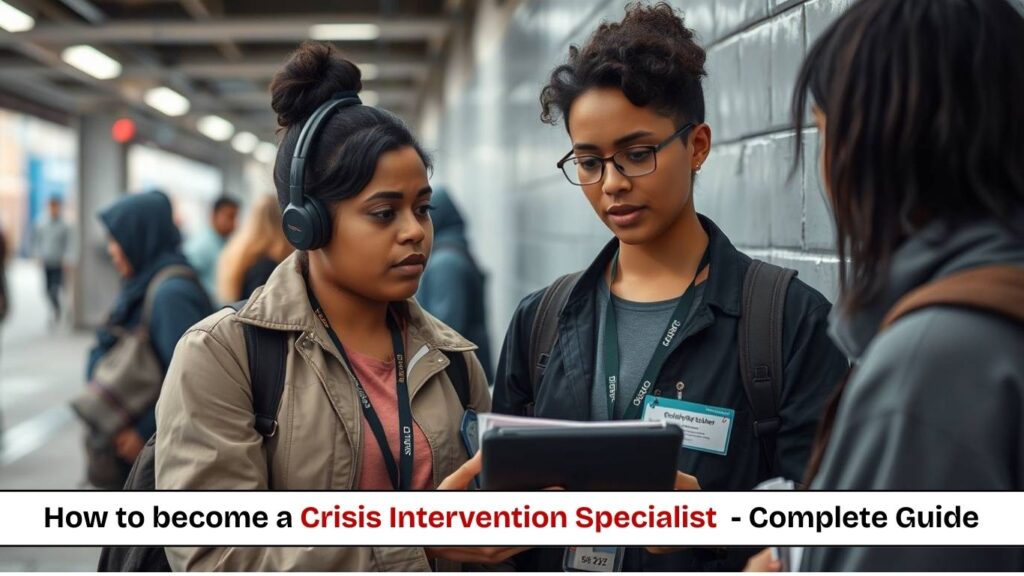
Introduction: The Critical Role of Crisis Intervention Professionals
Crisis Intervention Specialists serve as first responders for mental health emergencies, providing immediate support to individuals experiencing psychological distress, trauma, or suicidal ideation. With mental health crises increasing by 42% since 2020 (CDC data), these trained professionals have become essential in emergency rooms, hotlines, schools, and community settings.
This comprehensive guide covers everything you need to know about this vital career:
- Historical development of crisis intervention
- 2024 salary data by sector and location
- Core responsibilities breakdown
- Education & certification pathways
- Step-by-step career entry
- Emerging specializations
- Future industry trends
Whether you’re exploring career options or seeking to advance in the field, this guide provides the roadmap to success in crisis intervention work.
History of Crisis Intervention
Early Foundations (1940s-1960s)
- 1948: First suicide prevention center opens in Los Angeles
- 1960s: Community Mental Health Act establishes crisis services
- Pioneers like Gerald Caplan develop crisis theory models
Professionalization Era (1970s-1990s)
- 1974: First crisis intervention training programs
- 1980s: Expansion of mobile crisis units
- 1990s: Evidence-based protocols standardized
Modern Practice (2000s-Present)
- Integration with law enforcement (CIT programs)
- Telemental health crisis services
- Trauma-informed care approaches
- 988 Suicide & Crisis Lifeline implementation (2022)
Crisis Intervention Specialist Salaries (2024 Data)
Salaries vary significantly by:
- Work setting (government vs. nonprofit)
- Geographic location
- Credentials and experience
- Specializations
United States Salary Ranges
| Position | Entry-Level | Mid-Career | Experienced |
|---|---|---|---|
| Hotline Counselor | $35,000 | $42,000 | $50,000 |
| Mobile Crisis Team | $45,000 | $55,000 | $68,000 |
| Hospital Crisis Worker | $50,000 | $62,000 | $78,000 |
| Program Director | $60,000 | $75,000 | $95,000+ |
Highest-Paying States
- California: $68,000 avg
- New York: $65,000
- Massachusetts: $63,000
- Washington: $60,000
- Minnesota: $58,000
Work Setting Comparison
- Government: $55,000 avg
- Hospitals: $58,000 avg
- Nonprofits: $45,000 avg
- Private Practice: $75-$150/hour
- Schools: $52,000 avg
Roles & Responsibilities
Crisis Intervention Specialists perform critical functions across these key areas:
1. Immediate Risk Assessment
- Evaluate suicide/homicide risk
- Assess substance intoxication
- Determine safety needs
2. De-escalation Techniques
- Apply verbal intervention strategies
- Utilize trauma-informed approaches
- Manage aggressive behaviors
3. Resource Coordination
- Arrange emergency psychiatric care
- Connect to shelter/services
- Facilitate hospital admissions
4. Follow-Up Care
- Conduct post-crisis check-ins
- Provide referral coordination
- Develop safety plans
5. Documentation & Reporting
- Complete crisis evaluations
- Maintain case records
- Comply with legal mandates
Education & Certification Requirements
Standard Pathways
- Bachelor’s Degree in:
- Psychology
- Social Work
- Counseling
- Preferred Advanced Degrees:
- Master’s in Social Work (MSW)
- Master’s in Counseling Psychology
Essential Certifications
- Certified Crisis Worker (CCW)
- Crisis Intervention Team (CIT) Certification
- Mental Health First Aid Instructor
- ASIST (Suicide Intervention) Training
Specialized Training
- Psychological First Aid
- Trauma-Focused Crisis Intervention
- Substance Use Crisis Management
How to Become a Crisis Intervention Specialist: 5 Key Steps
Step 1: Earn Relevant Education
- Complete coursework in:
- Abnormal psychology
- Crisis theory
- Case management
Step 2: Gain Field Experience
- Volunteer at crisis hotlines
- Complete mental health internships
- Work as psychiatric technician
Step 3: Obtain Certifications
- Complete 40-hour crisis training
- Earn state-required credentials
- Pursue specialty certifications
Step 4: Develop Specializations
- Suicide Prevention
- Domestic Violence Crisis
- Disaster Response
- School-Based Crisis
- Veteran Mental Health
Step 5: Advance Your Career
- Pursue supervisory roles
- Become trainer/instructor
- Develop private consultancy
- Move into policy work
Future Outlook & Industry Trends
Strong Job Growth
- 18% projected growth (2022-2032)
- Over 9,000 new positions expected
- Driven by mental health crisis escalation
Emerging Specializations
- Digital Crisis Intervention
- Chat/text crisis services
- AI-assisted risk detection
- Integrated Emergency Response
- Co-responder models (mental health + police)
- Emergency department crisis teams
- Community-Based Prevention
- Crisis diversion programs
- Peer support specialist roles
- Global Crisis Response
- Disaster mental health teams
- Refugee trauma interventions
- Special Population Focus
- LGBTQ+ crisis services
- Geriatric crisis care
Is Crisis Intervention Work Right For You?
Ideal Candidates Possess:
✔ Emotional resilience
✔ Quick decision-making ability
✔ Cultural competence
✔ Stress management skills
Career Advancement Paths:
➔ Crisis program management
➔ Clinical supervision
➔ Policy development
➔ Training/consulting
➔ Research/evaluation
Getting Started Today:
- Complete Mental Health First Aid training
- Volunteer at local crisis center
- Shadow experienced specialists
- Join professional organizations (AAS, NASW)
Conclusion: A Career That Saves Lives
Crisis intervention work offers unparalleled opportunities to make immediate, life-saving impacts during people’s most vulnerable moments. With competitive salaries, diverse work settings, and growing societal need, this career combines professional challenge with profound purpose.
As mental health awareness expands and crisis systems evolve, skilled intervention specialists will remain essential to community safety nets. Your journey toward this rewarding career begins now.













Post Comment